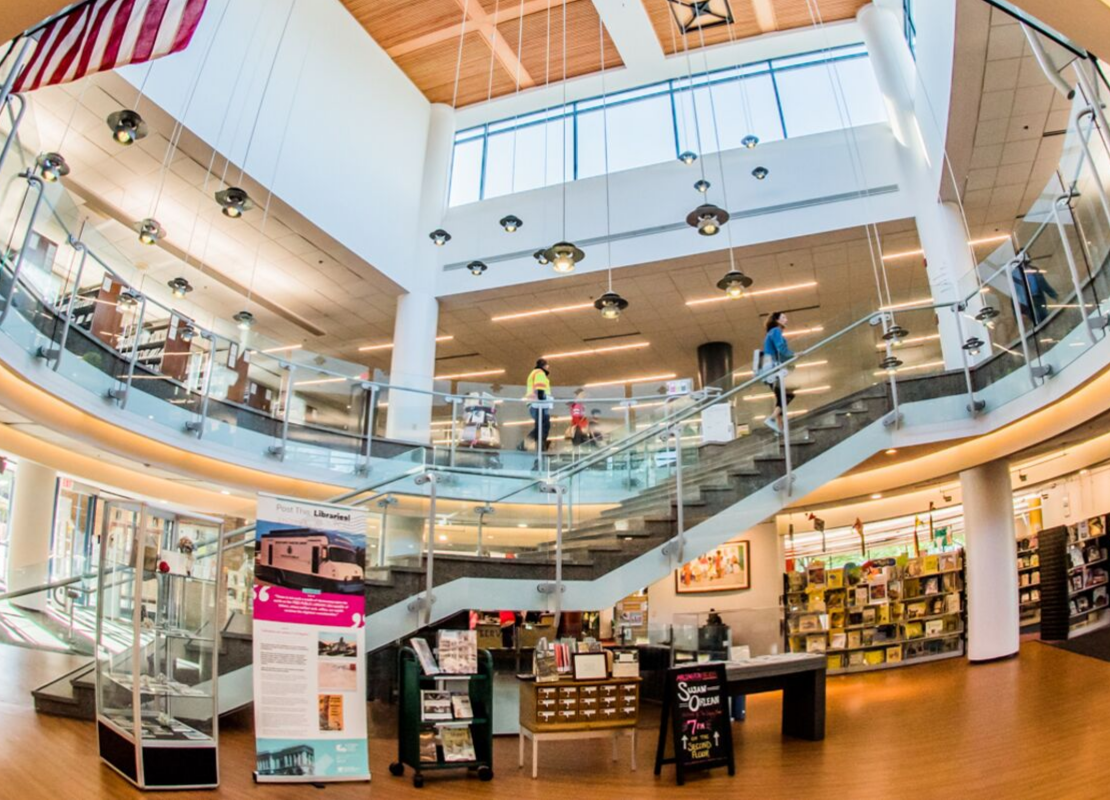Arlington’s Libraries Go the Extra Mile to Shape Health & Well-Being for Residents
By: Northern Virginia Health FoundationWhen sociologist Eric Klinenberg examined why residents in some poorer Chicago neighborhoods fared better than others during a historic heatwave, he found a striking pattern: those neighborhoods with lower death rates had more libraries and other kinds of “social infrastructure,” or communal spaces that draw people out of their homes and keep them connected.
A recent Health Affairs article confirmed Klinenberg’s observation, noting that libraries provide “safe spaces for social interaction, child and adult learning programs, and places of refuge during heatwaves, storms, and disasters. They also provide internet access that allows patrons to apply for jobs, do research and school work, or apply for college. And, increasingly, libraries are serving as places for physical activity and nutrition programs.”
Connecting residents to health information and services
One of the ways libraries support health is by serving as a hub for information about health services. Our library staff provides expert guidance, connecting visitors to medical research, and consumer health information. For many residents, the Library acts as a directory for available therapies and treatments in the area.
We are aware that conditions in the places where people live, learn, work, and play — the social determinants of life — affect a wide range of outcomes. An essential mediator of these social determinants is eliminating information poverty. Economic and social exclusion can result in information poverty, leaving residents at greater risk for exclusion in the broader community with fewer opportunities for advancement in education and employment.
For example, in May, we teamed up with the County Department of Human Services, one of our collaborators on Destination 2027, to host a week of health programs for the community. They included “chair yoga” classes for seniors and conversations on mental health care and healthy eating. This kind of information, practical advice from sources the residents trust, empowers residents to make more informed decisions about their health.
In September, our departments hosted a neighborhood fair at Barrett Elementary School, at which County departments, local businesses, and social service organizations shared information about their resources and services and health organizations administered basic health screenings. In planning the event, we worked closely with community groups and residents of the Buckingham neighborhood to include those services that would best meet their needs and interests. Raising awareness about the importance of good health and well-being is one of our goals, and we hope to roll out more programs like these. Whether it’s providing groceries to furloughed federal workers or offering free tax preparation help to people with low incomes, we want to be active participants in bringing services to people when and where they need them most.
Addressing transportation challenges
In the County’s 2018 Resident satisfaction Survey, we learned that transportation is often a barrier to library use. Residents need effective transportation options, not only to get to the library but for their daily lives.
A Northern Virginia Health Foundation report showed that more than a third of residents in one Buckingham neighborhood don’t have a vehicle, which could make it tough to get to the store to pick up groceries, travel to work or make it to childcare. And, unless they’re within walking distance of one of our branches, there’s no such thing as a quick trip to the library.
That’s why we’re mobilizing a van to take community members to and from the library to overcome that barrier. Watch for the van to begin hitting the streets later this year.
Serving the hardest to reach
The library also helps combat social isolation, a serious problem for many in our region. Social isolation can lead to anxiety, depression, and substance abuse. For seniors, isolation and loneliness can contribute to other serious physical and mental health problems.
We look for ways to serve those who need us the most, which is why we push so many of our “around-the-clock” services and why we have three locations – Central Library, Columbia Pike, and Shirlington - open on Sunday evenings.
We pride ourselves on being there for all citizens, regardless of their age, income, education level, race or ethnicity. We want residents to know that they are not alone, that they are not isolated, and that someone cares about them.
It’s why we’re working with the County Parks and Recreation department to put on art and health programs for young mothers and care providers.
It’s also why our staff has gone to Culpepper Garden to work with residents and make them aware of everything that the library offers. We let them know that they can come to get help using their technology devices or just stay for companionship. I would love to do more work with assisted living facilities to make sure we're a partner in combating loneliness and helping keep seniors’ minds sharp.
I am certain there are residents who don't know about us, who associate libraries with books and little else. If there are ways we can be more proactive in changing that perception, we want to hear them. We believe libraries change lives. Write us, email us, call us, or stop in to your local branch. You will always be welcome, and we will always try and help.
Photo: Copyright Josh Brick
